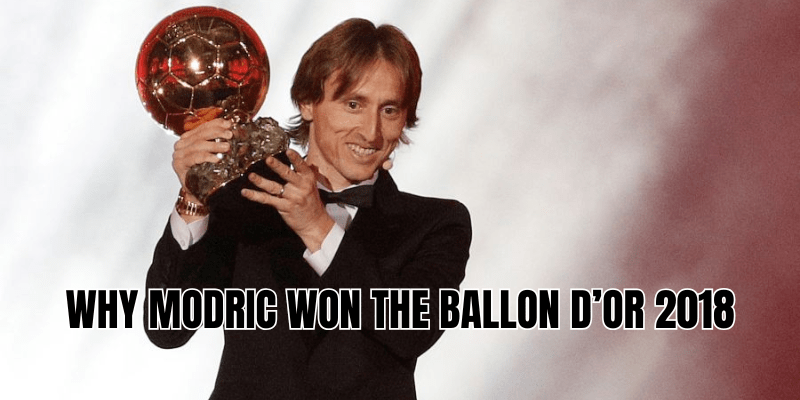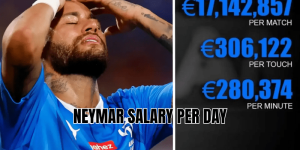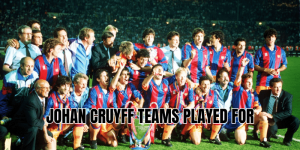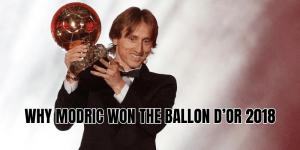In a year dominated by spectacle, goals, and high drama, Luka Modrić emerged as the unexpected conqueror—why Modric won the Ballon d’Or 2018 is not a fluke, but the result of a perfect storm: club glory, international heroics, peer recognition, and a long career’s worth of respect. In this article, DaoKick will walk you through the full story behind Modrić breaking the decade-long Messi-Ronaldo duopoly, examining his key performances, statistics, context, and controversies.
Context: A Decade of Messi–Ronaldo Dominance
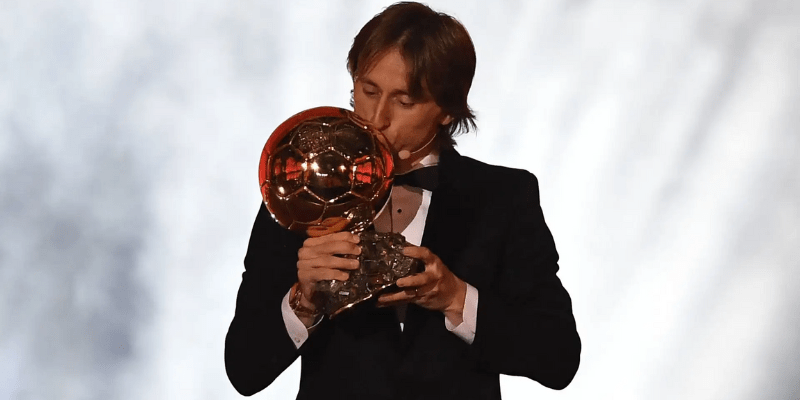
The Ballon d’Or was effectively locked in a duopoly: Lionel Messi and Cristiano Ronaldo traded titles like heirs to a throne. No other contender could consistently break through—until 2018. Modrić’s win was historic: he was the first player outside Messi or Ronaldo to lift the trophy since Kaká in 2007.
That context alone made his victory a statement: a recognition that football’s most central roles—midfield conductors, leaders—shouldn’t be ignored in favor of pure goal-getters.
But context is only part of the story. To understand why Modric won the Ballon d’Or 2018, we must dig into what he delivered on the pitch—in club and country—and how his peers, media, and voters judged him.
Club Achievements: Champions League and Real Madrid Mastery
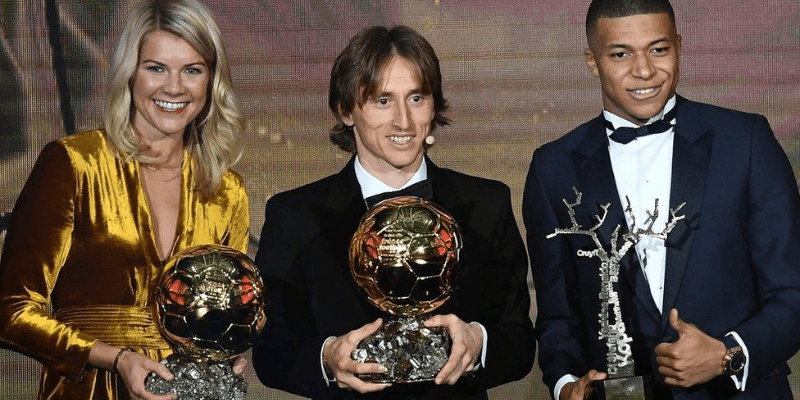
Mastermind of Real Madrid’s continental dominance
In 2018, Real Madrid became the first club in the modern era to three-peat the UEFA Champions League (2016, 2017, 2018). Modrić was central to that run—his vision, composure, passing range, and ability to control tempo made him indispensable.
He started in the final versus Liverpool and was named in the Champions League Team of the Season for the third consecutive year. His role was less about flashy headline stats and more about control, balance, transition, and enabling others.
Modrić also earned specific recognition for his performances in the competition, being viewed by many as one of the most complete midfielders in Europe in that cycle.
Domestic and global silverware
Though La Liga was not won that year, Modrić and Real secured other silverware (e.g., FIFA Club World Cup) and maintained high consistency in Spain’s top flight. His performances in midfield—shielding defense, creating attacks, controlling rhythm—kept Real in the conversation domestically and abroad.
These club achievements laid a strong foundation for his candidacy. But it was on the international stage that Modrić truly transformed.
International Brilliance: Croatia’s Historic Run and Golden Ball
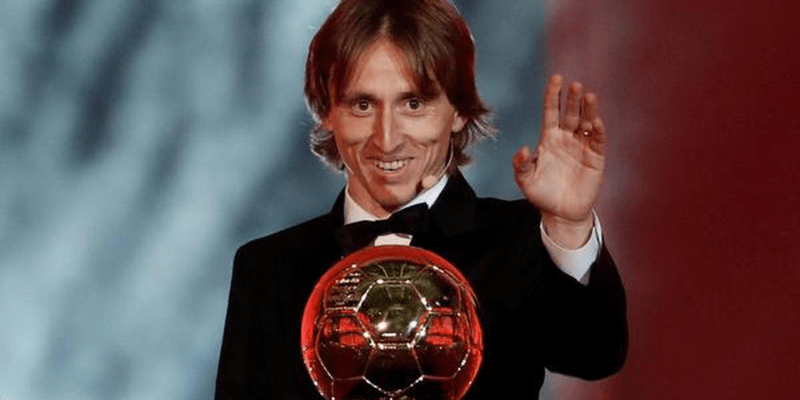
Captain and architect of Croatia’s dream run
Croatia had never reached a World Cup final before 2018. That year, Modrić captained his nation, led the midfield in every match, and carried the team in pivotal moments—against Argentina, Russia, England, and Nigeria. His tenacity, vision, ball retention under pressure, and ability to galvanize teammates made him Croatia’s heartbeat.
In the group stages, he scored and delivered key passes. In knockout matches, he orchestrated tempo and control—even often becoming the difference at critical junctions. That leadership under the brightest lights moved many observers to say Modrić defined the tournament.
Golden Ball winner
At the end of the World Cup, Modrić was awarded the Golden Ball as the tournament’s best player—even though Croatia lost the final to France. That award put on public record what many already thought: that among 32 elite teams, his influence was unmatched.
Winning both the Golden Ball and then shortly after the Ballon d’Or in the same calendar year makes Modrić part of a rarefied group. In fact, in 2018 he also won the UEFA Men’s Player of the Year and The Best FIFA Men’s Player awards—thus sweeping the major individual honors.
Statistical and Analytical Support
Opta and performance metrics
Objective numbers, especially from Opta-style metrics, support Modrić’s candidacy. While forwards may lead in goals and assists, Modrić ranked among the elite in:
- Pass accuracy and progressive passes
- Key passes and chances created
- Turnovers avoided in midfield
- Ball recoveries and interceptions
- Distance covered and pressing metrics
These indicators show that, in a season when elite forwards had plenty of competition (e.g., Griezmann, Messi, Salah), Modrić offered unmatched balance and consistency.
Vote margin and consensus
In the final Ballon d’Or tally, Modrić secured 753 points, notably ahead of Cristiano Ronaldo (476) and Antoine Griezmann (414). That gap signals more than a token upset—voters across nations gave widespread support.
Many praised his “complete” season: not the flashiest, but the one combining club and country impact most convincingly.
Why He Edged Out Ronaldo, Messi & Others
To fully answer why Modric won the Ballon d’Or 2018, we must see how he compared against the heavyweights:
- Cristiano Ronaldo: 2018 was Ronaldo’s first season at Juventus—his numbers remained strong, but without Champions League triumph and without a deep international run, his case lacked a hook.
- Lionel Messi: Messi performed admirably for Barcelona—but Argentina’s flop in the World Cup reduced his luster. Without a defining international campaign, Messi’s threat to Modrić was weaker.
- Antoine Griezmann: Griezmann had an excellent year — strong Dünya Cup, continental performance — but lacked the club-level dominance and all-round control that Modrić offered.
- Others (Salah, Mbappé, etc.): They delivered goals, speed, flair, but didn’t combine both club and international orchestration in the same way Modrić did.
Voters likely valued a year that wasn’t “peak statistical forward” but “complete influence across every level.”
Criticisms, Controversies & Counterarguments
Is it “less sexy” than a Messi or Ronaldo season?
Some critics objected, claiming the Ballon d’Or should prioritize attacking output. They argued Modrić lacked the goal glory to top Messi or Ronaldo. Others saw his win as sentiment—the “crowning moment” for a veteran d-mid in a spectacular year.
But defenders countered that the Ballon d’Or is not a golden boot, and football’s heart is in control, balance, defensive link, and leadership—all of which Modrić delivered perfectly in 2018.
The sentiment / narrative factor
No award is immune to narrative. Some believed Modrić’s age, longevity, and story contributed to sympathy votes: a veteran finally breaking through. Some skeptics say he won partly because the football world wanted change after years of Messi-Ronaldo cycles.
But the margin of victory, the consistency of his performances, and the fact that he had already won complementary awards make the narrative theory less persuasive as the full explanation.
Was this a “political” or club-leaning vote?
Accusations sometimes surface that Real Madrid influence (, media weight) sways votes. But given the breadth of the voting base—journalists across continents—and his international achievements, the consensus tilt toward Modrić is hard to dismiss as bias.
Legacy and Impact: How This Win Changed the Game
Modrić’s victory altered the narrative about what “best in the world” could look like. It showed midfielders—especially those who combined control, intelligence, work rate, and leadership—could contend at the very top.
Since 2018, his name features among all-time great midfielders. His win serves as inspiration to countless players who prove influence doesn’t always reside in goals.
For Croatia, it elevated national pride: their captain was now world champion in name. For Real Madrid, it reinforced their status as a club of holistic excellence rather than goal factories.
Final Thoughts
Why Modric won the Ballon d’Or 2018 isn’t a single metric—it’s the perfect alignment of club triumph, international mastery, peer respect, and statistical excellence. That year, Modrić transcended the simple equation of goals and assists to prove that orchestration, leadership, balance, and intangible influence matter just as much.
At DaoKick, we hope this deep dive gives you clarity and insight the next time someone questions his win. If you enjoyed this analysis, explore our other articles on Ballon d’Or history, player biographies, or comparative debates. Let’s talk more football, numbers, and legacy together.
